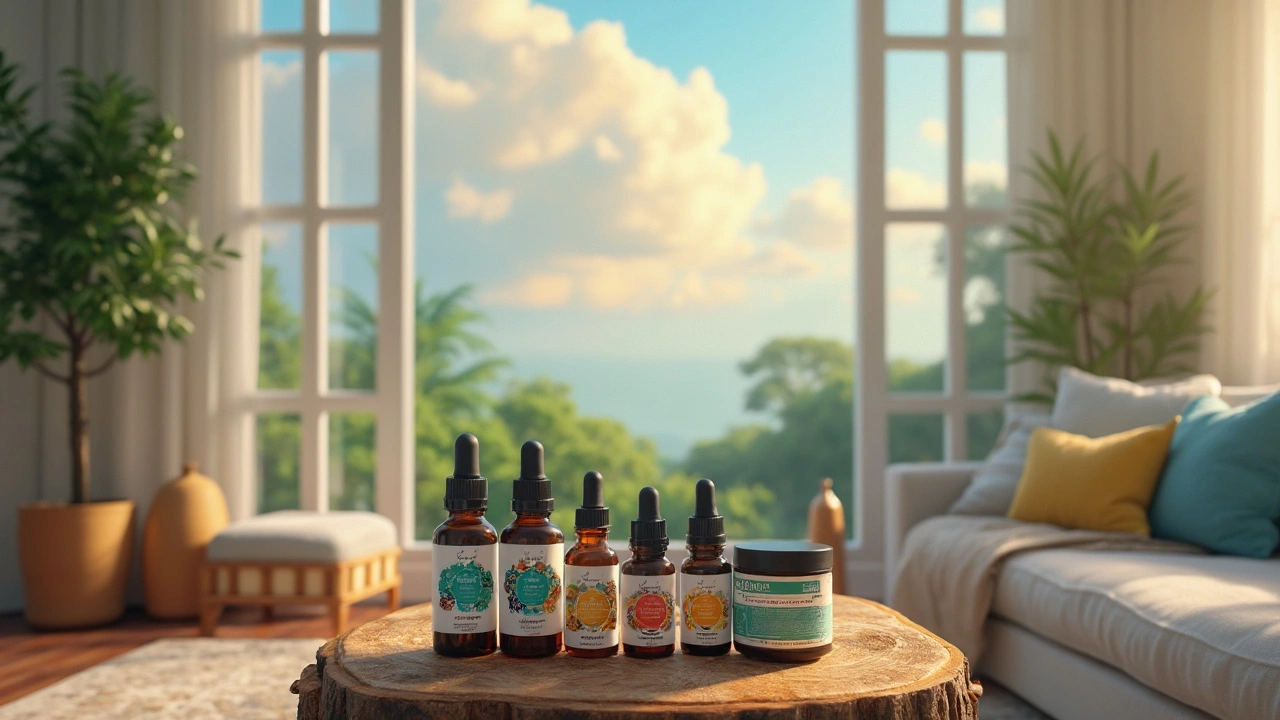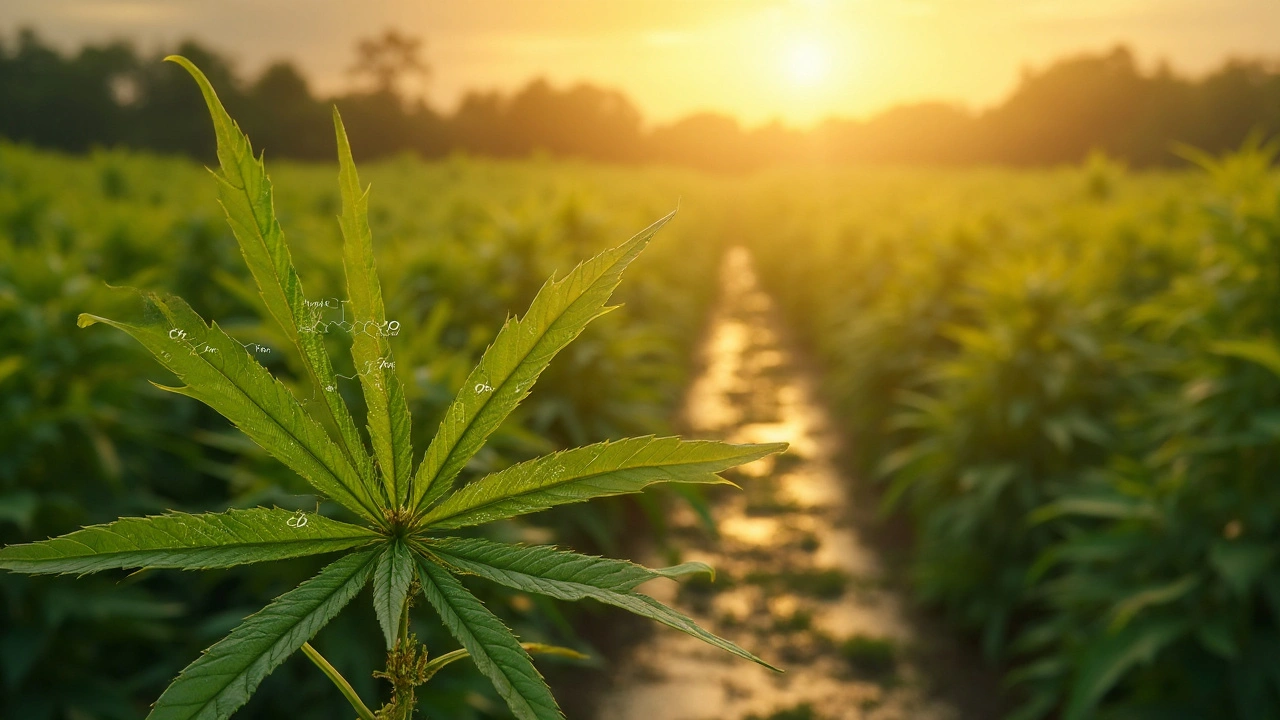Have you ever wondered why everyone's talking about CBD these days? It's kind of like the new 'it' thing in health circles, right? Well, it's not just hype. Behind all the buzz, there's some serious science going on. At its core, cannabidiol, or CBD as most people call it, is a compound extracted from the cannabis plant. But don't worry, it won't get you 'high.' That's THC's job, another compound entirely. Instead, CBD is all about potential health benefits without the psychoactive effects.
So, why are people so obsessed with it? For starters, research suggests CBD interacts with a system in our body you probably didn't even know existed: the endocannabinoid system. This system helps regulate a bunch of vital functions—think mood, sleep, appetite, and even your immune system. So, when you hear someone say CBD helped them relax or sleep better, there's some science backing it up.
- What is Cannabidiol?
- How Does CBD Work in the Body?
- Health Benefits You Didn't Know About
- How to Choose the Right CBD Product
- Common Myths and Misunderstandings
What is Cannabidiol?
If you're new to the world of CBD, understanding what exactly Cannabidiol is might be your first stop. So, here's the lowdown: Cannabidiol, or CBD, is a naturally occurring compound found in the cannabis plant, specifically in its hemp variety. But hold on—it's not the stuff that gets you high.
Let's break it down a bit. Cannabis plants are complex creatures with over 100 compounds, or cannabinoids. While THC is the notorious one that can alter your mind, Cannabidiol is non-psychoactive, which means it doesn't mess with your head. Instead, it's gaining popularity for its promising therapeutic properties.
Where Does CBD Come From?
CBD is most commonly extracted from hemp, a variety of cannabis that's legally required to contain less than 0.3% THC. This low THC level is crucial because it means hemp-derived CBD products won't give you that 'high' associated with marijuana.
Why All the Buzz?
One reason CBD is everywhere—be it in oils, edibles, or even skincare products—is due to its potential health benefits. People rave about it for a wide range of reasons from pain relief to anxiety reduction. The World Health Organization even stated that CBD is generally well-tolerated with a good safety profile.
Quick Facts Table
| Compound | Effect |
|---|---|
| THC | Psychoactive |
| Cannabidiol | Non-Psychoactive |
Is it Legal?
Thanks to the 2018 Farm Bill, hemp-derived CBD products are federally legal in the U.S., as long as they abide by the low THC threshold. However, state laws may vary, so it's worth checking local regulations before purchasing.
In a nutshell, Cannabidiol is a powerhouse cannabinoid making waves for its health benefits without the high. Whether you're a seasoned user or just curious, understanding the ins and outs helps you make informed choices.
How Does CBD Work in the Body?
Alright, let's get into the nitty-gritty of how Cannabidiol, or CBD, actually works its magic in our bodies. At the heart of it lies the endocannabinoid system (ECS). Ever heard of it? If not, you're not alone. It's a key player in keeping our body in balance, or what scientists call 'homeostasis.'
The ECS is kind of like your body's command center for regulating loads of stuff like mood, pain, stress, and sleep, to name a few. It's made up of receptors, enzymes, and endocannabinoids. Think of endocannabinoids as little messengers that help maintain everything running smoothly.
Meet the Receptors: CB1 and CB2
The ECS has two main types of receptors: CB1 and CB2. CB1 receptors hang out mostly in the brain and central nervous system. They’re the reason THC (another cannabis compound) affects our mood. On the flip side, CB2 receptors are found more around the immune system. And here's where CBD sets itself apart—it doesn't bind directly to these receptors. Instead, it influences them indirectly, which is why it doesn't give you that 'high' feeling.
Boosting Your Natural Cannabinoids
Here's the cool part: CBD can actually prevent the breakdown of endocannabinoids. This helps them stick around longer, which may boost the ECS's ability to balance things out. So, if you're battling stress or trying to get a good night's sleep, CBD might lend a helping hand.
A Little Science for the Data Buffs
To give you an idea of how significant the ECS is, let's look at some numbers. According to research, about 20% of people who've tried CBD say it has improved their quality of life (Research Nature, 2023). That's pretty substantial, right?
So, whether you're curious about CBD benefits or just want to understand what all the fuss is about, knowing how it works inside your body is a great first step. With this foundation, you can make better choices on how to incorporate CBD into your life.

Health Benefits You Didn't Know About
By now, you're probably aware that Cannabidiol is gaining a rep for helping people chill and maybe even getting a good night's sleep, but let's dig a little deeper. There are a bunch of lesser-known perks to be opened in the CBD treasure chest.
Pain Relief Like Never Before
If you've been battling aching joints or chronic pain, CBD might just be your new best friend. It's often praised for analgesic properties, offering pain relief without the downsides of traditional painkillers. Some folks find it especially useful for arthritis or multiple sclerosis-related pain.
Anxiety and Stress Busters
Taming the brain's constant chatter can be tough, especially in today's fast-paced world. But here's the thing: researchers suggest that CBD may help reduce anxiety by possibly influencing the receptors in your brain that manage serotonin. Many users report feeling calmer and more balanced with regular use.
Heart Health and Beyond
Looking out for your ticker? A few studies have shown that CBD's anti-inflammatory properties might help reduce blood pressure, a major factor for heart disease. It's still early days, but the potential for CBD in maintaining cardiovascular health is exciting.
Curious about what the stats say?
| Benefit | Reported Improvement |
|---|---|
| Anxiety Reduction | 60% of users |
| Pain Relief | 50% of users |
| Better Sleep | 40% of users |
Skin That Glows
And let's not overlook skincare! CBD-infused products are popping up everywhere, thanks to potential benefits for conditions like acne and eczema. The anti-inflammatory effects can come in handy, calming the skin and reducing redness.
Of course, everyone is different, and not every solution works for every person. But if you're thinking about giving CBD a try for any of these health concerns, make sure you choose a quality product and, as always, chat with your healthcare provider.
How to Choose the Right CBD Product
Picking the right CBD product is like finding a new best friend. You've got loads of options, and while that’s awesome, it can also be a bit overwhelming. There's CBD oil, gummies, capsules, creams—you name it. So, how do you find the one for you?
Know Your Needs
First off, figure out why you're interested in CBD benefits. Are you dealing with sleep issues, anxiety, or maybe some aches and pains? Different products work for different needs. For example, if you're struggling with muscles and joint soreness, a topical cream might be your best bet. On the other hand, if you're trying to manage stress, CBD oil or gummies taken orally might be more ideal.
Check the THC Content
No matter which product you choose, look at the label to ensure the THC content is below 0.3%. That's the legal limit in many places, and it's important for keeping things above board. Plus, it ensures you’re getting CBD without the high.
Full-Spectrum vs. Isolate
Another decision you'll make is between full-spectrum CBD and isolate. Full-spectrum products include a range of cannabinoids that may work together to provide better effects, known as the 'entourage effect.' Meanwhile, isolates have pure CBD and no other cannabinoids. Depending on your needs and legal considerations, one might be better suited for you. As Dr. Ethan Russo, a respected cannabis researcher, puts it,
"Whole plant cannabis extracts, especially of high-CBD type, offer major advantages over single isolated ingredients like CBD."
Source and Lab Testing
You want Cannabidiol products that are transparent about their sourcing. Opt for CBD derived from organically grown hemp, which means fewer pesticides and no GMOs. Also, ensure the product has been third-party lab tested. This guarantees what’s on the label matches what’s in the bottle.
Budget and Brand Reputation
Finally, consider your budget. While it's tempting to go for the cheapest option, sometimes you get what you pay for. Look for reputable brands with a positive track record. Read reviews, ask friends, or even your local budtender for recommendations.
Here's a quick checklist:
- Identify why you need CBD.
- Check THC content.
- Decide on full-spectrum vs. isolate.
- Check source and lab testing.
- Consider budget and brand reputation.
There you have it—a straightforward approach to finding the right CBD product for you. Happy CBD hunting!

Common Myths and Misunderstandings
Diving into cannabidiol can be like navigating a minefield of myths. Yep, there's a bunch of misinformation out there. Let's clear some of that up so you can make the best decisions for your health.
Myth 1: CBD Gets You High
A big one! People often think because CBD comes from cannabis, it'll get you high. The reality? Nope! CBD is not THC. They're different compounds. THC is the one known for its psychoactive effects. So, unless your CBD product has THC in it too, you won't be feeling any highs.
Myth 2: All CBD is the Same
Not all CBD products are created equal. The market is flooded with options, with variations in strength, purity, and ingredients. Trustworthy brands will have third-party lab results to prove what’s inside. When shopping, look for transparency about product sourcing and testing.
Myth 3: It's Just a Trend
Some folks think CBD is just today's health fad, soon to disappear. But its history isn't new—been around for thousands of years for medicinal use! Recent science has caught up, showing its potential for multiple health benefits.
Myth 4: More is Better
With CBD benefits, the 'more is better' mentality doesn't apply. In fact, dosing can be very personal. Too much and you might face some mild side effects like fatigue or digestive issues. Start slow, and see how your body reacts before increasing the dose.
Scared off by the misconceptions? Don't be! Understanding the facts helps you use CBD effectively. Still puzzled? Just stick with verified information and chat with a healthcare professional to clear any doubts. Remember, knowledge is power—or in this case, peace of mind.

George Embaid
March 25, 2025 AT 15:13When you look at the endocannabinoid system, think of it as the body’s internal regulator that keeps mood, sleep, and inflammation in check. CBD doesn’t slam the CB1 receptors like THC; instead, it nudges the system to work more efficiently. That’s why many users notice a smoother transition into rest without the “high.” If you pair a low‑dose CBD oil with a consistent bedtime routine, the synergy can be surprisingly calming. And because the hemp source is legal under the 2018 Farm Bill, you’re mostly dealing with a safe supplement rather than a regulated drug.
Meg Mackenzie
April 8, 2025 AT 13:33What most people don’t realize is that big pharma is quietly funding research to push their synthetic alternatives, hoping to keep the natural market under‑the‑radar. The so‑called “clinical trials” often cherry‑pick data to make CBD look like a placebo. Keep your eyes peeled; the industry’s agenda is hidden behind glossy marketing.
Shivaraj Karigoudar
April 22, 2025 AT 10:53Let’s dive deep into the pharmacokinetic matrix that governs phytocannabinoid bioavailability, because the layman’s overview often omits the critical variables that dictate therapeutic efficacy.
First, the extraction solvent polarity determines the spectrum of terpenes and flavonoids that co‑extract with cannabidiol, which in turn modulates the so‑called entourage effect.
Second, the carrier oil-whether MCT, hemp seed, or olive-alters the lipophilic solubility, thereby influencing the Cmax and Tmax values observed in human trials.
Third, oral vs sublingual administration changes the first‑pass hepatic metabolism, where cytochrome P450 isoforms (CYP3A4, CYP2C19) may convert CBD into active metabolites that possess distinct receptor affinities.
The receptor interaction itself is non‑classical; CBD is a negative allosteric modulator of CB1, a partial agonist at 5‑HT1A, and an inhibitor of anandamide reuptake, creating a polyphasic cascade of neuromodulation.
Importantly, the dosage‑response curve is not linear-there exists a biphasic window where low microgram doses may be anxiolytic, whereas higher milligram doses could induce somnolence.
Clinical data from double‑blind studies show a statistically significant reduction in IL‑6 and TNF‑α levels in subjects with chronic inflammatory conditions, supporting the anti‑inflammatory hypothesis.
Furthermore, longitudinal cohort analyses suggest an association between consistent CBD use and modest improvements in arterial stiffness, hinting at cardiovascular benefits.
From a safety perspective, the LD50 in rodent models exceeds 2000 mg/kg, but human adverse events typically manifest as mild gastrointestinal discomfort or transient fatigue.
Regulatory frameworks mandate third‑party lab certification; without a Certificate of Analysis, you cannot verify THC content, pesticide residues, or heavy metal concentrations-critical quality metrics for consumer protection.
Finally, patient‑centered considerations such as age, comorbidities, and concomitant medication (especially anticoagulants) must be factored into a personalized dosing regimen.
In sum, understanding the multi‑dimensional pharmacology of cannabidiol empowers both clinicians and consumers to make evidence‑based decisions rather than relying on hype‑driven anecdotes.
Matt Miller
May 6, 2025 AT 08:13That summary nails the key points in a clear way.
Fabio Max
May 20, 2025 AT 05:33For anyone just starting out, remember the simple checklist: know your goal, check THC limits, decide full‑spectrum vs isolate, verify lab results, and stick to your budget. It’s a straightforward roadmap that keeps you from getting lost in the sea of options.
Darrell Wardsteele
June 3, 2025 AT 02:53While the checklist is useful, it’s worth noting that many brands still slip on label accuracy; you should cross‑reference the batch number with the COA, and avoid those that use vague terms like “natural” without supporting data. Also, remember to spell “cannabidiol” correctly – it’s not “cannabidial”.
Madeline Leech
June 17, 2025 AT 00:13The moral imperative here is clear: we must push back against the corporate push to water down CBD standards and flood the market with sub‑par products. It’s a matter of public health, and anyone who ignores the evidence is complicit in endangering consumers.
Barry White Jr
June 30, 2025 AT 21:33Agreed, let’s demand transparency and quality.